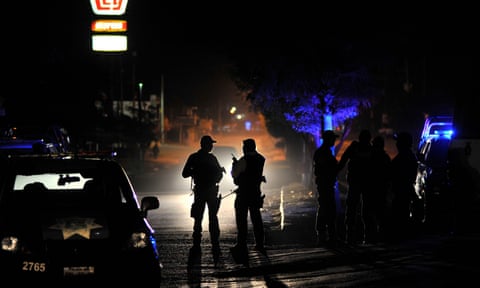Engines revved, tires squealed and tail lights faded into the distance as an Audi raced a Mini Cooper down the street past apartment buildings and empty lots. The spectators – boys in baseball caps, girls in short skirts – lounged against their own luxury vehicles, drinking beer.
The drag races roared for more than an hour as darkness fell over Culiacán, but the neighbours never complained about noise, and the police never turned up to put an end to the fun.
No wonder: the racers were most probably the children of some of Mexico’s most powerful crime bosses. Known collectively as “narco-juniors”, this generation of narcos has discarded the discretion of their elders, replacing it with conspicuous displays of wealth, violence and impunity.
And it is a generation that is now on the frontlines of a violent struggle for control of the Sinaloa cartel, which has been sunk into a war of succession since the capture and extradition to the US of Joaquín “El Chapo” Guzmán.
“The generational change has started – and it seems like the process is not going so well,” said Adrián López, editor of the Sinaloa newspaper Noroeste. And with El Chapo sitting in a US prison, “there’s no longer anyone to referee the disputes between them”.
The disputes have turned Sinaloa – a long sliver of pine-clad mountains and Pacific coast beaches – into one of Mexico’s most violent states in 2017. But the shockwaves have been felt across the country.
This week, a former policeman once described as Guzmán’s right-hand man was arrested in Mexico City, after reportedly clashing with El Chapo’s sons.
Federal officials say Dámaso López Núñez – who once helped El Chapo’s escape from prison – had sought to partner with the upstart Jalisco New Generation cartel, which has disputed Sinaloa cartel territories up and down the Pacific coast.

López’s war with Guzmán’s sons – Iván Archivaldo Guzmán Salazar and Jesús Alfredo Guzmán Salazar, known collectively as Los Chapitos – is believed to be behind a wave of violence in Sinaloa and Baja California Sur.
El Chapo was born in the rugged mountains of the Sierra Madre, where he grew up in abject poverty before becoming one of the most powerful figures in the Sinaloa cartel.
Those mountains were his unquestioned fiefdom, but with Guzmán locked up in a New York high-security unit, rival crime groups are now making brazen incursions.
Last year, gunmen from the smaller Beltrán Leyva cartel looted the home of Guzmán’s elderly mother in the hamlet of La Tuna.
More recently, violence has focused on the sun-scorched agricultural valleys around Culiacán and at the crossroads town of Villa Juárez, where rival factions are fighting over local drug sales.
In one incident this February, a convoy of trucks – including one with a .50 calibre machine mounted in a rotating turret – pulled into Villa Juárez and opened fire at a Pemex petrol station. Four people, including a pregnant woman, were killed.
Three months later, the bullet holes that pock the filling station’s facade are still visible under a fresh coat of paint, but locals are still unwilling to talk. “I don’t want to get involved in it,” said an employee while a jaunty narcocorrido – a song lionizing drug lords – blared in the background.
“All the violence,” said the employee, “It’s like being in Afghanistan or something.”
As he spoke, he kept an eye on the steady stream of motorcycles that buzzed past – the preferred mode of transport for cartel lookouts.
In the unkempt town square, a street vendor refused to make eye contact as he slowly set out gleaming tubes of lipstick on his table. “Yes, there’s violence,” he allowed, but then fell silent.

The wave of violence suggests if El Chapo had a plan for succession, it has fallen into chaos. In his 2016 Rolling Stone interview with Guzmán, Sean Penn described Iván as the heir apparent. “He’s attentive with a calm maturity,” Penn said of Iván, who was charged in the 2004 murder of a Canadian exchange student and a male companion as they left a Guadalajara-area bar.
A 2005 psychological profile from a prison stay said the younger Guzmán demonstrated “probable psychological violence toward persons that he does not consider on his socio-economic level”.
Cartel observers say that Iván and Jesús Alfredo – who grew up in a life of luxury – are not ready to take over their father’s empire. “The only thing they’re good at is spending El Chapo’s money,” said Mike Vigil, former DEA head of international operations. “They’ve never had to get their hands dirty. They’re not street smart like El Chapo.”
Vigil pointed to a confusing incident last year, in which Jesús Alfredo was seized by gunmen – possibly from the rival CJNG – from a restaurant in Puerto Vallarta, before being released after an apparent deal.
“They’re very lucky to be alive,” Vigil said.
Locals, however, say that Iván retains one important advantage over the CNJG and the remnants of López’s faction: the lingering affection for his father felt by many in the state, where among the state’s rural and poor population El Chapo is revered as a Robin Hood figure who thumbed his nose at the authorities even as he doled out patronage and charity.
“He owns this town,” said a journalist covering organized crime in Culiacán. He said that Iván Guzmán is thought to have an “army” of hitmen in Culiacán, along with spies in all parts – everyone from youngsters on motorcycles to people washing windshields at intersections to employees at hotels. Iván Guzman isn’t shy about showing off. He tweets to flash his fancy cars, trips on private planes and exotic animals in his keep. He also rails against the government and denounces the “many who have turned on us”.
Locals say that the younger Guzmán is fond of racing a red Ferrari through Culiacán, a city of around 900,000 that is home to the kind of premium auto dealerships and luxury shops seldom seen in provincial Mexican cities.
And few doubt that the Guzmáns’ word is law in the city: one local described seeing cartel bodyguards stop traffic so one of El Chapo’s sons could do doughnuts in his white Nissan GT-R at a traffic junction.
Unlike the first generation of cartel bosses, the new wave of cartel are often university educated and more likely to choose Italian slip-ons and Jaguars than their father’s ostrich skin cowboy boots and Hummers.
But the generational changes go beyond material tastes. One former cartel gunman, expressed dismay at the ethical shortcomings of the younger bosses, and – over a plate of seak tacos – reminisced about a time when narcos had “honour”.
“15, 20 years ago, if we wanted to kill you and you turned up with your wife and children, we couldn’t do anything. We couldn’t touch you,” said the man, who once worked for Ismael “El Mayo” Zambada, a contemporary of El Chapo.
“Now, they don’t give a damn … If they see you in a taco stand, they’ll come and shoot it up,” he said.
Over decades, the people of Sinaloa have grown used to living alongside organised crime; now, however, many fear that changes are on their way – and that change will inevitably bring more violence.
Leticia Villegas insists that her brother Adolfo – a teacher and part-time contract lawyer – had nothing to do with the underworld. But in March, he was grabbed from his small Chevy less than a block from his home and hasn’t been seen since.
“They say this is a dispute between different groups,” she said, “but it’s harming innocent people.”
- This article was amended on 6 May to clarify that Leticia Villegas’s brother Adolfo is a part-time contract lawyer.
